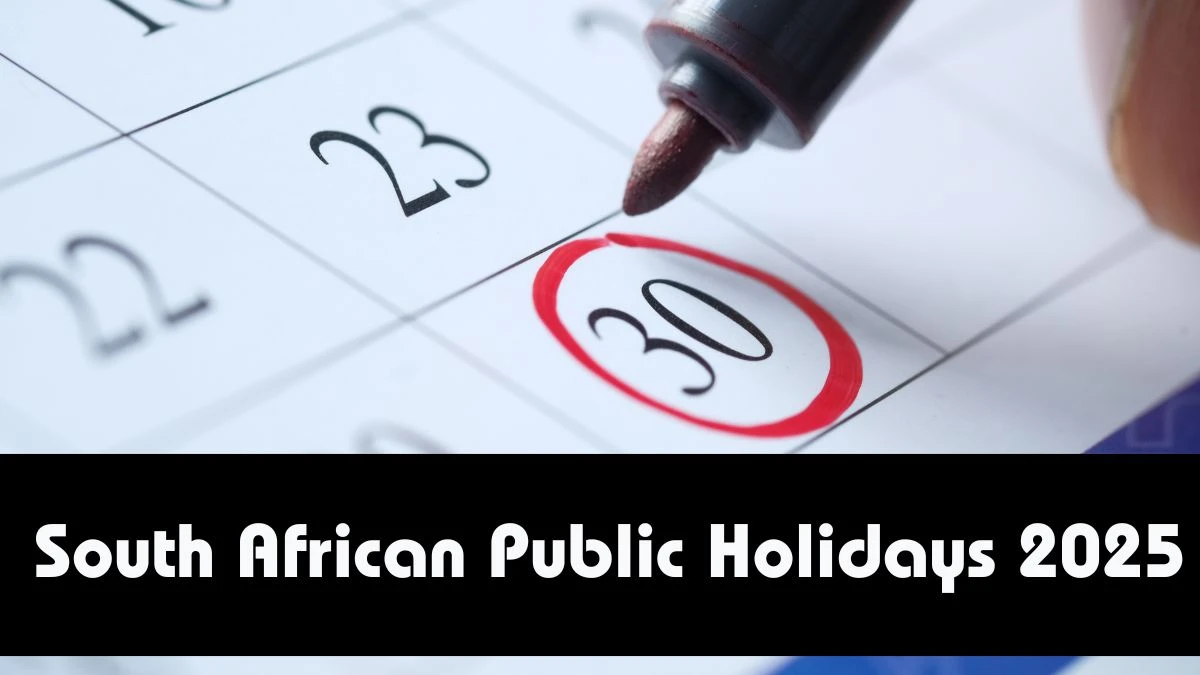South African Public Holidays 2025
South Africa celebrates several public holidays throughout the year, each with its own unique significance, reflecting the country's rich history, cultural diversity, and shared values.
In 2025, South Africans will observe key national holidays, including historic events like Freedom Day and Youth Day, religious observances such as Good Friday and Christmas Day, and celebrations of unity and cultural heritage such as Heritage Day.
Whether for reflection, celebration, or family bonding, these public holidays offer an opportunity for the nation to honor its past, present, and future.
| Date | Holiday |
|---|---|
| 1 January | New Year’s Day |
| 21 March | Human Rights Day |
| 18 April | Good Friday * |
| 21 April | Family Day |
| 27 April | Freedom Day |
| 28 April | Public holiday Freedom Day observed ** |
| 1 May | Workers' Day |
| 16 June | Youth Day |
| 9 August | National Women’s Day |
| 24 September | Heritage Day |
| 16 December | Day of Reconciliation |
| 25 December | Christmas Day |
| 26 December | Day of Goodwill |
List of Public Holidays 2025 in South Africa
Here is a list of all the public holidays in South Africa for 2025.
# 1 January - New Year’s Day
In South Africa, New Year’s Day is a public holiday celebrated every January 1st. It marks the beginning of the new year in accordance with the Gregorian calendar, which is the standard calendar used both locally and globally.
Key Highlights:
- Excitement and Joy: The day is welcomed with festivities, fireworks, beach outings, and family gatherings. Many people celebrate at midnight on December 31st with countdown parties and continue the celebration into January 1st.
- Cultural and Social Significance: It is a time for reflection, setting resolutions, and spending quality time with loved ones.
- Public Holiday: Since it is a national holiday, most businesses and government offices remain closed, giving people the opportunity to enjoy a break.
# 21 March - Human Rights Day
Human Rights Day in South Africa is commemorated annually on March 21 and holds deep historical and national significance. The day is linked to the tragic events of March 21, 1960, which occurred in Sharpeville, Gauteng.
Key Highlights:
- On March 21, 1960, a peaceful protest against the apartheid government’s Pass Laws turned violent when police opened fire on unarmed demonstrators.
- 69 people were killed and around 180 were wounded, making the Sharpeville Massacre a turning point in South African history.
- The protest was part of a broader resistance to laws that restricted the movement of Black South Africans.
# 18 April - Good Friday *
A significant Christian holiday commemorating the crucifixion of Jesus Christ. Observed with religious services, reflection, and fasting. It is part of the Easter weekend and marks a time of spiritual significance for many South Africans.
Key Highlights:
- Commemorates the crucifixion of Jesus Christ.
- Observed with church services and reflection.
- Part of the Christian Easter weekend
# 21 April - Family Day
Celebrated on the Monday following Easter Sunday, Family Day encourages South Africans to spend quality time with their loved ones. It emphasizes unity, rest, and togetherness after the solemnity of Easter.
Key Highlights:
- Promotes family bonding and rest.
- Follows Easter Sunday.
- Often celebrated with family meals and outings.
# 27 April - Freedom Day
Freedom Day commemorates South Africa’s first democratic elections held on 27 April 1994. It marks the end of apartheid and the beginning of a new democratic era. Celebrations include political speeches, cultural events, and community gatherings.
Key Highlights:
- Marks the first democratic elections in 1994.
- Celebrates the end of apartheid.
- Symbolizes national liberation and unity.
# 28 April - Public holiday Freedom Day observed **
When a public holiday like Freedom Day falls on a Sunday, the following Monday is observed as a public holiday. This ensures that citizens still benefit from a day off work to mark the occasion.
Key Highlights:
- Compensatory public holiday if Freedom Day falls on a weekend.
- Allows South Africans to still benefit from the public observance.
# 1 May - Workers' Day
International Workers' Day honors the contributions of workers and the labor movement. In South Africa, it also commemorates the struggle for fair labor practices during apartheid. It's marked by rallies, speeches, and labor union activities.
Key Highlights:
- Honors workers and labor rights.
- Commemorates past struggles against exploitation.
- Often observed through union events and rallies.
# 16 June - Youth Day
This day commemorates the Soweto Uprising of 1976, where thousands of students protested against the mandatory use of Afrikaans in schools. It honors the bravery of the youth who fought for their rights, particularly Hector Pieterson, one of the first students shot by police.
Key Highlights:
- Remembers the 1976 Soweto Uprising.
- Pays tribute to student activists, especially Hector Pieterson.
- Focuses on youth empowerment and education.
# 9 August - National Women’s Day
National Women’s Day honors the 1956 march of over 20,000 women to the Union Buildings in Pretoria to protest against pass laws. It recognizes women’s role in the liberation struggle and ongoing contributions to society.
Key Highlights:
- Commemorates the 1956 Women’s March against pass laws.
- Highlights women’s rights and gender equality.
- Encourages female empowerment and community celebrations.
# 24 September - Heritage Day
This day celebrates the diverse cultural heritage of South Africa. Citizens are encouraged to recognize and embrace their traditions. Many enjoy braais (barbecues), wear traditional clothing, and celebrate with song, dance, and storytelling.
Key Highlights:
- Celebrates cultural diversity and heritage.
- Encourages wearing traditional attire and hosting braais.
- Promotes unity in diversity.
# 16 December - Day of Reconciliation
Originally commemorated by both Afrikaner and liberation movements for different reasons, this day now symbolizes reconciliation and national unity. It encourages healing from South Africa's divided past and promotes peace.
Key Highlights:
- Symbolizes healing after apartheid.
- Encourages forgiveness and national unity.
- Recognized by both former Afrikaner and liberation groups.
# 25 December - Christmas Day
A Christian holiday celebrating the birth of Jesus Christ. It's a time for family gatherings, feasts, gift-giving, and church services. It's widely celebrated across religious and cultural lines.
Key Highlights:
- Celebrates the birth of Jesus Christ.
- A time for religious services, gift-giving, and family gatherings.
- Widely celebrated across different cultures.
# 26 December - Day of Goodwill
Formerly known as Boxing Day, this day encourages generosity and charity. It’s a time to rest after Christmas, visit friends and family, and share with those less fortunate.
Key Highlights:
- Encourages generosity and community care.
- Known as Boxing Day in many countries.
- A day to relax, share, and give to the less fortunate.






